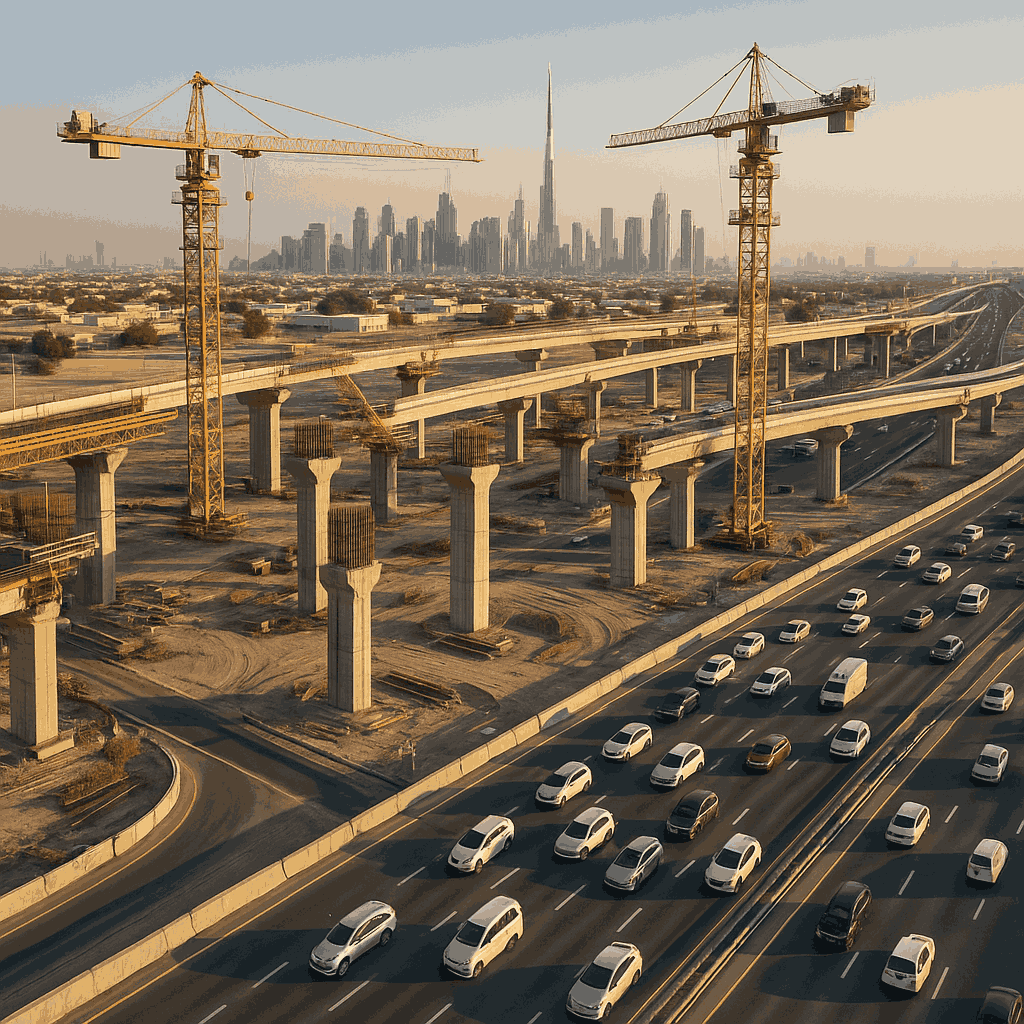Dubai’s Roads and Transport Authority (RTA) has officially announced a landmark AED 700 million contract for the development of a new bridge on Dubai-Al Ain Road and the expansion of Al Meydan Street. This high-profile initiative underscores Dubai’s continued investment in enhancing its road infrastructure to support growing traffic volumes and future urban expansion.
Scope of the Project: Dubai-Al Ain Road Bridge Construction

Key Features of the Dubai-Al Ain Road Bridge
The newly contracted project involves the construction of a three-lane bridge in each direction along the Dubai-Al Ain Road corridor, a vital arterial route connecting Dubai with Abu Dhabi. The bridge will:
- Span approximately 1.2 kilometers.
- Accommodate over 20,000 vehicles per hour in both directions.
- Include advanced traffic management systems and intelligent lighting infrastructure.
- Feature pedestrian and cycling paths to align with Dubai’s multimodal mobility goals.
Integration with Existing Infrastructure
The new bridge will connect with Sheikh Mohamed bin Zayed Road and Emirates Road, streamlining vehicle movement and eliminating major traffic bottlenecks. The project will also synchronize with other mega infrastructure projects, including upcoming smart city developments and key business zones.
Al Meydan Street Expansion: Enhancing Urban Connectivity
Major Upgrades and Additions
As part of the contract, Al Meydan Street will undergo a major overhaul, with the following enhancements:
- Widening the road to five lanes in each direction.
- Addition of service roads, parking bays, and dedicated bus lanes.
- Construction of two new intersections to ease traffic flow and reduce delays.
- Improved stormwater drainage systems and utility duct networks.
Supporting Real Estate and Economic Zones
Al Meydan is one of Dubai’s rapidly growing neighborhoods, home to residential towers, Meydan Racecourse, and commercial districts. This upgrade will bolster connectivity between Downtown Dubai, Business Bay, and Meydan One, supporting the vision of a seamless urban mobility network.
Timeline and Execution Partners
Expected Project Duration
The contract, awarded to a leading UAE-based engineering and construction firm, is set to be completed within 30 months. RTA has committed to stringent timelines and efficient project management, utilizing Building Information Modeling (BIM) and GIS tracking to monitor progress in real-time.
Sustainable Construction Practices
The RTA has emphasized adherence to green building standards, including:
- Use of recyclable materials.
- Minimizing carbon emissions with electric construction equipment.
- Ensuring dust suppression and noise reduction protocols.
Benefits for Daily Commuters and Residents
Reduced Travel Time and Congestion
Once completed, the new Dubai-Al Ain Road Bridge and Al Meydan expansion will:
- Reduce travel time by 35% during peak hours.
- Improve traffic capacity on both routes by over 60%.
- Create dedicated exits and access points for major communities like Nad Al Sheba and Al Quoz.
Boost to Public Transportation and Mobility
The integration of bus-only lanes and shared mobility platforms along the upgraded corridor aims to increase public transport ridership and promote sustainable commuting options.
Part of Dubai’s 2040 Urban Master Plan
This project is a vital component of the broader Dubai 2040 Urban Master Plan, which prioritizes:
- Integrated transportation hubs.
- Smart traffic management using AI and IoT.
- Green corridors and walkability in urban areas.
By enhancing strategic transport routes, RTA is directly contributing to Dubai’s goals of becoming the most livable city in the world.
Investment and Economic Impact
AED 700 Million Investment Breakdown
The total investment includes:
- AED 450 million for bridge construction and civil works.
- AED 150 million for utility relocations and service integrations.
- AED 100 million allocated for landscaping, lighting, and smart signage systems.
Job Creation and Business Growth
The project is expected to create over 2,500 direct and indirect jobs, boosting Dubai’s engineering, logistics, and construction sectors. Additionally, improved access will encourage real estate development and commercial investments along the corridor.
Smart City Technologies and Traffic Control Integration
AI-Enabled Traffic Systems
The new infrastructure will feature AI-enabled signal systems to control intersections and adjust timings dynamically based on real-time traffic flow, ensuring maximum efficiency and minimal delays.
Data Collection and Predictive Maintenance
Embedded sensors and data-gathering tools along the roads will:
- Monitor traffic volume, vehicle speed, and air quality.
- Predict maintenance requirements before failure occurs.
- Feed into RTA’s central traffic command center for proactive incident management.
Community and Stakeholder Engagement
Minimizing Disruption During Construction
RTA has implemented a comprehensive traffic diversion and awareness campaign, including:
- Temporary road signage and alternative routes for drivers.
- Regular updates via RTA’s app and social media.
- Collaboration with local communities to minimize impact on residents and schools.
Public Feedback Channels
Residents can submit concerns or feedback via:
- RTA’s official website.
- Toll-free customer service.
- On-ground information booths in affected areas.
Conclusion: A Milestone for Dubai’s Transport Future
The awarding of the AED 700 million contract for the Dubai-Al Ain Road Bridge and Al Meydan Street expansion is more than just a transportation project—it is a statement of intent. Dubai continues to invest boldly in smart infrastructure, sustainability, and economic resilience. As construction begins, the city is poised to enhance mobility, reduce congestion, and improve quality of life for millions of residents and commuters.
